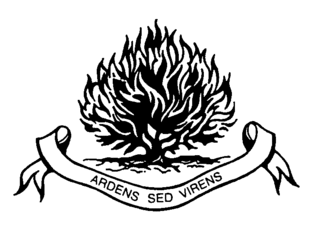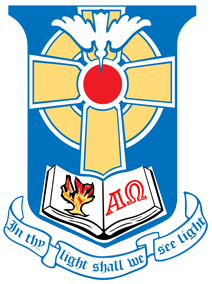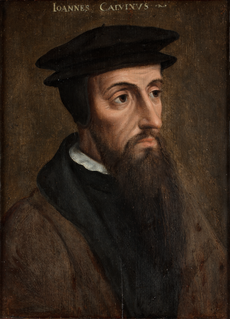Related Research Articles

Presbyterianism is a part of the Reformed tradition within Protestantism that traces its origin to the Church of Scotland.

The Presbyterian Church (USA), abbreviated PC(USA), is a mainline Protestant denomination in the United States. It is the largest Presbyterian denomination in the US, and known for its relatively progressive stance on doctrine and ordains women and LGBT community as elders and ministers. The PC(USA) was established by the 1983 merger of the Presbyterian Church in the United States, whose churches were located in the Southern and border states, with the United Presbyterian Church in the United States of America, whose congregations could be found in every state. The similarly named Presbyterian Church in America is a separate denomination whose congregations can also trace their history to the various schisms and mergers of Presbyterian churches in the United States. Unlike the PCA, the PC(USA) supports evangelical feminism and supports practise of same gender marriages. It also welcomes gay and lesbian persons to serve in leadership positions as ministers, deacons, elders, and trustees.
Presbyterianpolity is a method of church governance typified by the rule of assemblies of presbyters, or elders. Each local church is governed by a body of elected elders usually called the session or consistory, though other terms, such as church board, may apply. Groups of local churches are governed by a higher assembly of elders known as the presbytery or classis; presbyteries can be grouped into a synod, and presbyteries and synods nationwide often join together in a general assembly. Responsibility for conduct of church services is reserved to an ordained minister or pastor known as a teaching elder, or a minister of the word and sacrament.

The Presbyterian Church in America (PCA) is the second-largest Presbyterian church body, behind the Presbyterian Church (USA), and the largest conservative Calvinist denomination in the United States. The PCA is Calvinist in theology and presbyterian in government. It is characterized by a blend of Calvinist practice and broad evangelicalism.

The Associate Reformed Presbyterian Church (ARPC), as it exists today, is the historical descendant of the Synod of the South, a Synod of the Associate Reformed Church. The original Associate Reformed Church resulted from a merger of the Associate Presbytery and most of the Reformed Presbytery in Philadelphia in 1782. The northern Synods eventually merged with the forebearers of the Presbyterian Church (USA). It is one of the oldest of the United States' theologically and socially conservative denominations.

The Presbyterian Church in the United States of America (PCUSA) was the first national Presbyterian denomination in the United States, existing from 1789 to 1958. In that year, the PCUSA merged with the United Presbyterian Church of North America, a denomination with roots in the Seceder and Covenanter traditions of Presbyterianism. The new church was named the United Presbyterian Church in the United States of America. It was a predecessor to the contemporary Presbyterian Church (USA).

The United Presbyterian Church of North America (UPCNA) was an American Presbyterian denomination that existed for one hundred years. It was formed on May 26, 1858 by the union of the Northern branch of the Associate Reformed Presbyterian Church with the Associate Presbyterian Church (Seceders) at a convention at the Old City Hall in Pittsburgh. On May 28, 1958, it merged with the Presbyterian Church in the United States of America (PCUSA) at a conference in Pittsburgh to form the United Presbyterian Church in the United States of America (UPCUSA).
The Reformed Presbyterian Church in the United States was a small Presbyterian denomination based in the United States that merged into the Vanguard Presbytery. The RPCUS was established in 1983, subscribes to the unrevised Westminster Confession and upholds biblical inerrancy. The denomination self-identified as theonomic.
The Church of Pakistan is a united Protestant Church in Pakistan, which is part of the Anglican Communion and a member of the World Communion of Reformed Churches and the World Methodist Council.
The Evangelical and Reformed Church (E&R) was a Protestant Christian denomination in the United States. It was formed in 1934 by the merger of the Reformed Church in the United States (RCUS) with the Evangelical Synod of North America (ESNA). A minority within the RCUS remained out of the merger in order to continue the name Reformed Church in the United States. In 1957, the Evangelical and Reformed Church merged with the majority of the Congregational Christian Churches (CC) to form the United Church of Christ (UCC).

The Presbyterian Church of Brazil is an Evangelical Protestant Christian denomination in Brazil. Oldest of the Reformed family of Protestantism in Brazil. It is the largest Presbyterian denomination in the country, having an estimate 649,510 members, 4,475 ordained ministers and 5,068 churches and parishes. It is also the only Presbyterian denomination in Brazil present in all 26 States and the Federal District. It was founded by the American missionary Rev. Ashbel Green Simonton, who also oversaw the formal organization of the first congregation and the first Presbytery. Although the Presbyterian Church of Rio de Janeiro was only formally organized in January 1863, and the Brazilian church only left the jurisdiction of the joint missions board of the American churches in 1888, when the Synod was formed, the denomination considers the date of Simonton's arrival in Brazil, August 12, 1859, as its foundation date.
The Presbyterian Church of Pakistan is the largest Presbyterian, Reformed denominations is the second largest Protestants in Pakistan. It was formed in 1993 by the merger of United Presbyterian Church of Pakistan (1855-1993) and Council of Churches of Lahore.
The Covenant Presbyterian Church (CPC) is a Protestant, Reformed denomination, founded in United States in 2006 by a group of churches that split from the Reformed Presbyterian Church General Assembly for supporting paedocommunion.

The National Presbyterian Church in Mexico is the second-largest Protestant church, and the largest Reformed denomination in Mexico. It is present throughout the country, and is particularly strong in the states of Tabasco, Chiapas, Campeche, Yucatan, Nuevo León, Aguascalientes and Mexico City.
The Presbyterian Church of the Philippines (PCP), officially The General Assembly of the Presbyterian Church of the Philippines, is a growing evangelical, Bible-based Reformed church in the Philippines. It was officially founded in 1987 and the General Assembly was organized in September 1996.
The Reformed Church in Japan is a confessional Calvinist denomination in Japan. It was formerly a member of the World Communion of Reformed Churches, but it chose to suspend its membership.
The Reformed Presbyterian Church in Taiwan was officially established in 1971 when the First Presbytery was formed as a result of the union of various conservative Presbyterian and Continental Reformed congregations planted by various missionary groups. Its origin could be traced back to the 1950s when the very first missionaries of those Presbyterian and Continental Reformed missionaries arrived in Taiwan.

Presbyterianism has had a presence in the United States since colonial times and has exerted an important influence over broader American religion and culture.
For the current denomination, founded in 1968, dissenting from this, see United Presbyterian Church of Pakistan
References
- 1 2 "World Reformed Fellowship: Member Denominations". March 10, 2020. Retrieved July 22, 2020.
- ↑ "The Battle of Pasrur". October 3, 2017. Retrieved February 10, 2022.
- ↑ "Reformed Online: Presbyterian Church of Pakistan" . Retrieved August 11, 2015.
- ↑ "Unity of Christian Churches in Pakistan" . Retrieved August 11, 2015.
- ↑ "Presbyterian Seminary in Gujiranwala" . Retrieved August 11, 2015.
- ↑ "The Battle of Pasrur". October 3, 2017. Retrieved February 10, 2022.
- ↑ "Presbyterian Church (USA): Presbyterian Church of Pakistan" . Retrieved 11 Aug 2015.
- ↑ "History of the merger of the Presbyterian Church of Pakistan" . Retrieved August 11, 2015.
- ↑ "Home | Injeeli Consultancy".
- ↑ "Seminar of the Society of Biblical Christian Churches of Pakistan" (PDF). Archived from the original (PDF) on 28 November 2009. Retrieved August 11, 2015.